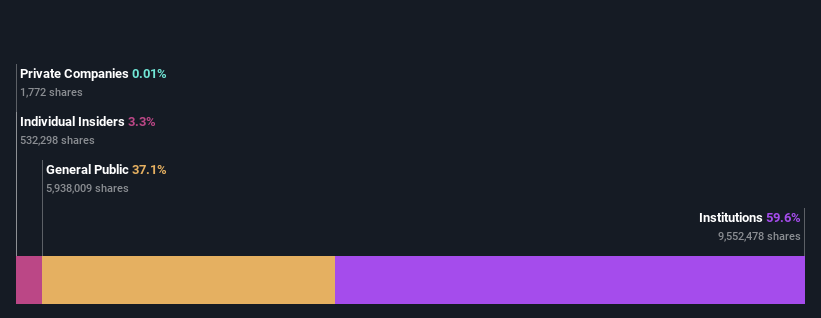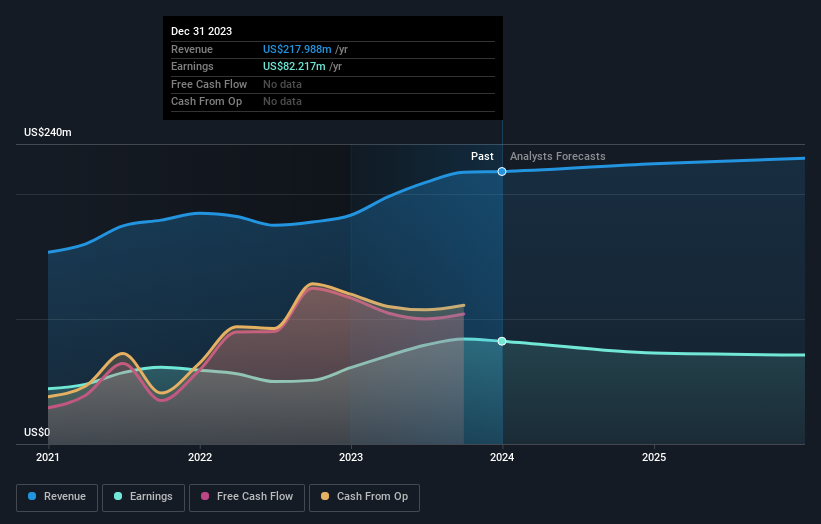With 60% ownership, Mercantile Bank Corporation (NASDAQ:MBWM) boasts of strong institutional backing
Key Insights
Institutions' substantial holdings in Mercantile Bank implies that they have significant influence over the company's share price
A total of 25 investors have a majority stake in the company with 50% ownership
Ownership research along with analyst forecasts data help provide a good understanding of opportunities in a stock
A look at the shareholders of Mercantile Bank Corporation (NASDAQ:MBWM) can tell us which group is most powerful. We can see that institutions own the lion's share in the company with 60% ownership. Put another way, the group faces the maximum upside potential (or downside risk).
Because institutional owners have a huge pool of resources and liquidity, their investing decisions tend to carry a great deal of weight, especially with individual investors. Hence, having a considerable amount of institutional money invested in a company is often regarded as a desirable trait.
Let's delve deeper into each type of owner of Mercantile Bank, beginning with the chart below.
See our latest analysis for Mercantile Bank
What Does The Institutional Ownership Tell Us About Mercantile Bank?
Institutions typically measure themselves against a benchmark when reporting to their own investors, so they often become more enthusiastic about a stock once it's included in a major index. We would expect most companies to have some institutions on the register, especially if they are growing.
We can see that Mercantile Bank does have institutional investors; and they hold a good portion of the company's stock. This can indicate that the company has a certain degree of credibility in the investment community. However, it is best to be wary of relying on the supposed validation that comes with institutional investors. They too, get it wrong sometimes. If multiple institutions change their view on a stock at the same time, you could see the share price drop fast. It's therefore worth looking at Mercantile Bank's earnings history below. Of course, the future is what really matters.
Institutional investors own over 50% of the company, so together than can probably strongly influence board decisions. Hedge funds don't have many shares in Mercantile Bank. Looking at our data, we can see that the largest shareholder is BlackRock, Inc. with 9.7% of shares outstanding. Meanwhile, the second and third largest shareholders, hold 7.2% and 4.9%, of the shares outstanding, respectively. Additionally, the company's CEO Robert Kaminski directly holds 0.8% of the total shares outstanding.
Looking at the shareholder registry, we can see that 50% of the ownership is controlled by the top 25 shareholders, meaning that no single shareholder has a majority interest in the ownership.
While studying institutional ownership for a company can add value to your research, it is also a good practice to research analyst recommendations to get a deeper understand of a stock's expected performance. There are plenty of analysts covering the stock, so it might be worth seeing what they are forecasting, too.
Insider Ownership Of Mercantile Bank
While the precise definition of an insider can be subjective, almost everyone considers board members to be insiders. The company management answer to the board and the latter should represent the interests of shareholders. Notably, sometimes top-level managers are on the board themselves.
Insider ownership is positive when it signals leadership are thinking like the true owners of the company. However, high insider ownership can also give immense power to a small group within the company. This can be negative in some circumstances.
Our most recent data indicates that insiders own some shares in Mercantile Bank Corporation. As individuals, the insiders collectively own US$19m worth of the US$583m company. It is good to see some investment by insiders, but it might be worth checking if those insiders have been buying.
General Public Ownership
The general public, who are usually individual investors, hold a 37% stake in Mercantile Bank. While this size of ownership may not be enough to sway a policy decision in their favour, they can still make a collective impact on company policies.
Next Steps:
I find it very interesting to look at who exactly owns a company. But to truly gain insight, we need to consider other information, too. For instance, we've identified 1 warning sign for Mercantile Bank that you should be aware of.
Ultimately the future is most important. You can access this free report on analyst forecasts for the company.
NB: Figures in this article are calculated using data from the last twelve months, which refer to the 12-month period ending on the last date of the month the financial statement is dated. This may not be consistent with full year annual report figures.
Have feedback on this article? Concerned about the content? Get in touch with us directly. Alternatively, email editorial-team (at) simplywallst.com.
This article by Simply Wall St is general in nature. We provide commentary based on historical data and analyst forecasts only using an unbiased methodology and our articles are not intended to be financial advice. It does not constitute a recommendation to buy or sell any stock, and does not take account of your objectives, or your financial situation. We aim to bring you long-term focused analysis driven by fundamental data. Note that our analysis may not factor in the latest price-sensitive company announcements or qualitative material. Simply Wall St has no position in any stocks mentioned.


